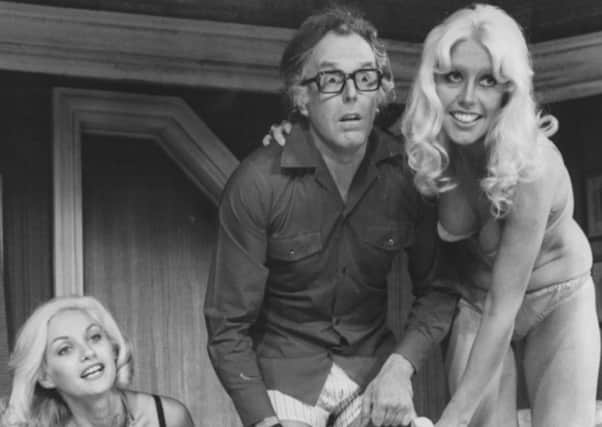Obituary: Lord Brian Rix, actor and disability campaigner


WWhile Laurence Olivier and John Gielgud may cast larger shadows across the British theatrical landscape, Brian Rix was a bigger attraction in his time. His farces were hugely popular from the 1950s through to the 1970s, at London’s Whitehall Theatre, on tour and on television, where a Brian Rix farce was regarded as a special event.
It was low-brow stuff that never impressed the critics. But Rix seemed to know what the public wanted and he gave it to them, reputedly making him Britain’s highest-earning actor in Britain in the 1960s.
Advertisement
Hide AdAdvertisement
Hide AdThere were puns and doubles entendres aplenty – one of his ITV shows was called Well I’m Burgled and his first volume of autobiography was My Farce From My Elbow. The plots invariably involved much confusion and mistaken identity, with Rix as a naïve innocent caught in compromising situations, generally having lost his trousers. He reckoned he dropped his trousers on stage around 12,000 times.
Rix was a man of his time, appealing to much the same audience as George Formby, Carry On films and saucy postcards, in an age before full-frontal nudity and the rise of political correctness.
He had married the Scottish actress Elspet Gray in 1949 and the first of their four children Shelley had Down’s Syndrome. The couple were horrified by attitudes to the condition, which was not fully understood at the time. A doctor asked Rix if he had venereal disease or was drunk at the time of conception and Rix’s own father could never bring himself to mention the girl.
Rix more or less retired from the stage in the second half of the 1970s and became heavily involved with the charity Mencap, raising awareness of learning disabilities and serving as secretary-general, chairman and president, a post he held till his death.
He was knighted in 1986 and he became a peer in 1991. Baron Rix of Whitehall took his seat in the House of Lords as a crossbencher and frequently spoke on behalf of the disabled. His grandfather had founded a successful shipping company and Brian Norman Roger Rix was born into an affluent family in Cottingham in Yorkshire in 1924. His father worked in the family business, his mother was involved in amateur dramatics and Rix helped out from an early age.
At Quaker public school he showed an exceptional talent for cricket – he would later play for the MCC – and for comedy, a skill he developed to detract bullies. He was seemingly picked on after one of his testicles was mistakenly removed in an operation and word got out.
His parents had wanted him to become a doctor, but his elder sister had become an actress – as Sheila Mercier she would appear in the Whitehall farces and play Annie Sugden in Emmerdale Farm for more than 20 years.
Rix decided he would become an actor too and as a teenager toured with Donald Wolfit’s company. Initially he reckoned he might become a great tragedian, but reconsidered after his trousers fell down one night during a performance of A Midsummer Night’s Dream. The audience burst into laughter and he was able to play up the mishap to his advantage.
Advertisement
Hide AdAdvertisement
Hide AdAs well as acting, Rix also served as producer, putting on his own shows. Many of his early productions lost money. In 1950 he toured with Reluctant Heroes, an army farce, written by Colin Morris. It opened at the Whitehall Theatre later that year, and in 1952 it was the first West End production broadcast on BBC television.
The play ran for four years and 1,600 performances. Subsequent Rix farces extended his run at the Whitehall theatre to 16 years. People joked that visitors to London could see farces at both ends of Whitehall.
In the second half of the 1960s his home base switched from the Whitehall to the Garrick, where Let Sleeping Wives Lie and Don’t Just Lie There, Say Something were both long-running hits. And, although Glasgow has proven to be a graveyard for many comics, touring versions of Rix’s farces were big attractions at the King’s Theatre in the 1960s and early 1970s.
There were also films of several of his farces in the 1950s and at the beginning of the 1960s. Reluctant Heroes was a hit on the big screen, but generally he was not quite as successful in the cinema as he was in the theatre or on television. Odd to say it, but perhaps the Carry On series was just a little more sophisticated, as well as being a little more risque.
Don’t Just Lie There, Say Something was filmed in 1973, with Leslie Phillips as the hypocritical government minister, campaigning against declining moral standards. Rix played his hapless friend, Joan Sims was Phillips’s wife and Joanna Lumley his secretary.
Reviewing it for the Monthly Film Bulletin, Gareth Jones said it was “so unexceptionally mediocre as to be beneath constructive comment”. Derek Malcolm in the Guardian, Alexander Walker of the London Evening Standard and John Coleman of the New Statesman all gave it no stars.
By the 1970s Rix’s heart was no longer in it. He talked of the guilt he felt at having sent Shelley off to live in a home and gave up his still-lucrative showbiz career to devote all his energies to working for Mencap and campaigning for better care and rights for those with learning disabilities.
Rix’s health had been failing for some time and latterly he was in constant pain. Earlier this month, he spoke in support of assisted dying. His daughter Shelley died in 2005, aged 53. His wife died in 2013. They are survived by three other children.